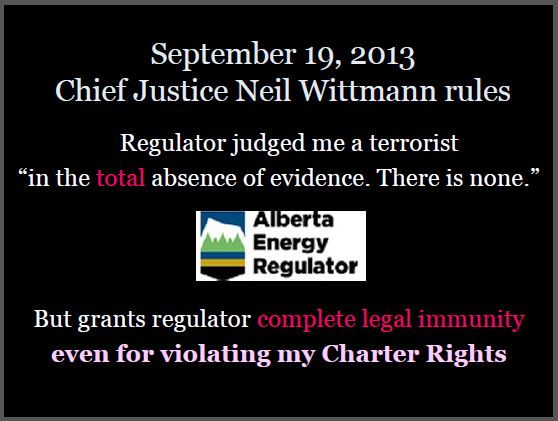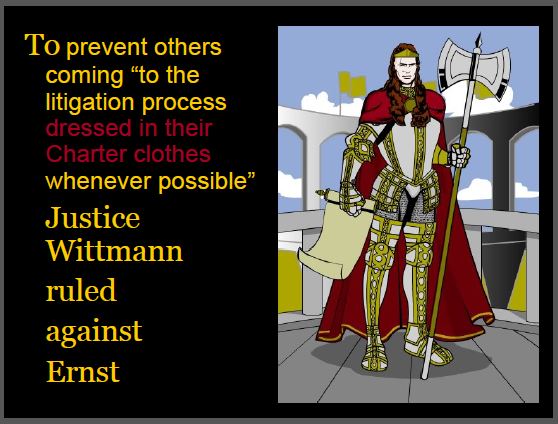Federal energy regulator violates Charter, court case alleges; “The NEB (National Energy Board) has lost its way,” said lawyer David Martin by David Geselbracht, March 23, 2015, Vancouver Observer
A group of concerned citizens has filed a constitutional challenge with Canada’s highest court today, frustrated with the National Energy Board’s review of the Kinder Morgan pipeline, a process they believe is fundamentally undemocratic.
“The NEB has lost its way,” said David Martin, a lawyer representing the group of landowners, business people, and academics. [Isn’t it refreshing to see media calling Canadians what they are, instead of calling them names to discredit their reasonable, valid concerns, names such as “radical extremist” or “terrorist” or crazy political grandstander to keep Harper / Encana / energy regulators et al happy?]
In 2014 the NEB granted intervenor status to 400 applicants, while hundreds of other citizens were denied. The status allows those accepted to submit arguments and more fully participate with the hearings.
Mr. Martin believes that by denying applicants the right to have their voice heard, the NEB has infringed on their basic rights. “It violates the Charter of Rights and Freedoms that guarantees freedom of expression,” he said in a phone interview.
The proposed $5.4-billion Trans Mountain expansion would twin the pipeline and triple the capacity for Alberta oil intended for Asian markets. The project has been at the centre of intense media and public scrutiny, with detractors fearing potential oil spills from both the pipeline and oil tankers, and proponents saying it will create jobs and bring in revenue for the province.
Martin believes that due to legislation enacted by the Conservative federal government several years ago, a healthy discussion is being stifled. And this is why they are going to court
Gutting of the NEB Act
In 2012 the federal government drastically changed the rules for participation in the review of industrial projects, like Kinder Morgan, by amending the NEB Act.
Before the changes, any interested group or citizen could voice their concerns regarding a pipeline or other project, but after the legislation was enacted, individuals could only participate if they were “directly affected” by a pipeline — or, had “relevant information or expertise.”
Critics believe this effectively gave the NEB too much power to decide who had “relevant” expertise. It allowed them to stifle anyone with concerns the board deemed irrelevant. Today, issues like CO2 emissions from oil sands development or the potential for oil tanker spills do not seem to constitute relevant information.
“The NEB doesn’t want to look at the upstream or downstream implications of this pipeline — and that’s wrong,” said Mr. Martin.
Dr. Lynne Quarmby, chair of the molecular biology department at Simon Fraser University, who is also part of the court filing, thinks the limits on intervenor status cripples effective environmental oversight.
“There is essentially no meaningful environmental review anymore,” she said.
Two previous attempts
This isn’t the first time the applicants have challenged the legality of the NEB’s review process, and its decision to limit participation.
In 2014 they filed two motions with the NEB which were subsequently dismissed later that year.
In a defence of their process, the NEB cited court cases where limits on expression were accepted, and were not in contravention with the Charter. In one example it stated:
“The freedom of expression contained in [The Charter of Rights and Freedoms] prohibits gags, but does not compel the distribution of megaphones.” The implication being clear: not everyone gets a voice.
“The Applicants have not established that… the NEB Act or the Board’s actions in the Project hearing violate the Charter,” therefore, the NEB defence concludes, their requests have been “denied.”
Not long after the NEB decision, the group filed papers with the Federal Court of Appeal (FCA). In January of this year they were denied again, this time by the FCA. No reasons were provided for the denial.
Purpose of the NEB
In the documents filed with the Supreme Court of Canada (SCC), the applicants stated that the purpose of the NEB is historically one of promoting participation and discussion.
The board has a mandate to “ensure meaningful public participation in environmental assessments,” it reads, citing the Canadian Environmental Assessment Act.
The filing also describes other infrastructure projects where the NEB has been required to look at both upstream and downstream effects, such as when a hydroelectric line was being constructed in Quebec in the 1990’s.
In this case, the Board eventually determined that the project was not merely “a line of wire,” because it would “create an expanded network for distribution and result in environmental impacts upstream,” according to the documents.
If the NEB has taken into account upstream effects before, it’s possible that the SCC may decide they should again.
Next steps
Since the 2012 amendments by the federal government, “public participation has plummeted — and with it the legitimacy of the review process,” the challenge document reads.
But if the SCC decides that applicants like Dr. Quarmby should have their day in court (a decision could take up to six months), Mr. Martin is hopeful that the NEB review will allow more voices to participate.
“Freedom of expression is the beating heart of democracy,” he said. “If legislation excludes the public from public hearings, then it defeats the entire purpose of this process.” [Emphasis added]


Slides from Ernst presentations
An Alberta government lawyer argued in court this week that Jessica Ernst’s lawsuit on hydraulic fracturing and groundwater contamination should be struck down on the grounds that it would open a floodgate of litigation against the province.
“There could be millions or billions of dollars worth of damages,” argued Crown counsel Neil Boyle.
Ernst vs AER Supreme Court of Canada Docket
Supreme Court of Canada Justice Rosalie Abella, Justice Andromache Karakatsanis and Justice Suzanne Côté to decide if the court will hear Ernst’s case
Suzanne Côté is a partner and head of the Montréal litigation practice at Osler, Hoskin & Harcourt LLP – firm representing Encana in the Ernst vs Encana
Environmental advocates take NEB fight to Supreme Court by Mark Hume, March 23, 2015, The Globe and Mail
An environmental organization and a group of concerned citizens are asking the Supreme Court of Canada to hear a complaint that the National Energy Board is violating their rights to free speech. …
Vancouver lawyer David Martin said about 1,000 leaves to appeal are made to the Supreme Court of Canada each year and only about 70 or 80 of them are selected to be heard. …
Mr. Martin said if the Trans Mountain pipeline is built, it will be in place “for probably the next century” and the NEB has a responsibility to look at the long-term impacts.
“A long-term view must be taken, yet the board has adopted a tunnel vision. That tunnel vision has been criticized broadly, has led to allegations that the board is biased and in the pocket of the oil industry. And ultimately citizens of Canada have lost faith in its neutrality and objectivity,” he said.
In a memorandum of fact filed with the court, the applicants state that the NEB “has barred hundreds of citizens” and more than 20 of Canada’s leading scientists from participating in the Trans Mountain hearings.
“How could the board, the primary national infrastructure regulator, make an advance determination to exclude its own national environmental impacts scientists from being heard?” the memo asks. “History suggests that this type of outcome only occurs when some form of aberrant ‘anti-scientific’ ideology has captured the legislative process. It is precisely in such circumstances that the freedom of expression guarantee, the hallmark of constitutional democracy, fulfills its vital purpose and intent.”
Tara O’Donovan, a communications officer for the NEB, said in an e-mail that as the matter is before the courts, it would be inappropriate for the board to comment. [Emphasis added]
2015 02 04: Court rejects Burnaby Mountain pipeline legal challenge
The environmental organization is claiming the NEB is infringing on people’s Charter rights by restricting public participation in the Kinder Morgan pipeline hearing and refusing to hear concerns related to climate change and oil-sands development. On Jan. 23, Justice Marc Nadon of the Federal Court of Appeal rejected the case.
“Honestly, I was not terribly surprised to hear that news,” said Ruth Walmsley, one of the Burnaby residents named as an applicant in the case. “I was disappointed because I was hoping that the case would have an opportunity to be heard at that level, but we realized at the beginning that we may need to take it to a higher court.” …
“We’re not going to give up,” said David Martin, the group’s lawyer. “We believe the legislation is unconstitutional. It violates freedom of expression and it precludes the public from properly participating in the National Energy Board hearings.”
Martin explained that the case is about challenging the NEB’s new procedures, brought in after the Conservative government changed the NEB Act, narrowing the scope of participants in pipeline hearings to those who are “directly affected” by the project.
For example, if the pipeline runs through someone’s backyard, that person would be considered directly affected, but the larger community as a whole is being excluded, Martin explained.
“These are complex legal formulations, but they boil down to that,” he said. “God forbid we should hear from the community.”
Besides ForestEthics Advocacy, there are eight people listed as applicants in the case. John Clarke, another Burnaby resident involved in the case, lives close to the Burnaby Mountain tank farm. He applied as an intervenor in the NEB hearing but was given commenter status, meaning he can only write a letter expressing his stance on the proposed expansion. Walmsley applied to participate as an intervenor in the NEB hearing but was rejected entirely. SFU professor Lynne Quarmby, who recently moved to Burnaby, is also one of the applicants in the case.
In regards to the original motion from ForestEthics Advocacy, NEB spokesperson, Sarah Kiley, explained that the board did not find the applicants had established that the NEB Act or the board itself were violating the Charter.
“That’s why they decided to deny this motion,” Kiley said. “The board made a comment I thought was interesting, … ‘the substantial interference with freedom of expression does not follow simply because the applicants have been denied their preferred means of expression.'” [Sound like Mr. Glenn Solomon arguing for the AER?]
Kiley also pointed out that the NEB doesn’t create legislation; politicians and parliamentarians are responsible for the NEB Act. [Emphasis added]
